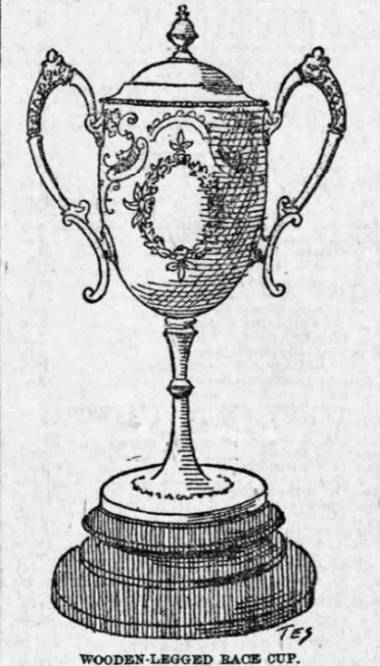The Peg Leg Race

Norena Shopland
Following the successes of the Paralympic Games in Paris recently, it brought to mind the story of the ‘Peg Leg Race,’ 121 years ago, as well as a few other races.
At the turn of the twentieth century, there was a craze for walking races — different from running as one foot must always be in contact with the ground — and the forerunner of today’s race walking, now an Olympic sport (modern sports include more differences).
Inspired by this craze, the Evening Express issued a challenge on 2 May 1903 to Cardiff’s Coal Exchange – the building famous for issuing of the first one-million-pound cheque. While not convinced the Cardiff men could equal the efforts of London, the Express thought they should at least try.
Coal men
The Coal men quickly accepted the challenge, as did the Cardiff Stock Exchange, and they planned to race from the Angel Hotel, via Cowbridge and Bridgend, to Porthcawl, about 26 miles.
There were 24 competitors, the winner being a Coalman, F. C. Matthews setting a time of 4 hours 42 minutes and 16 seconds.
Non-members of the Exchanges walked behind the event, including a well-known walker from Porthcawl called Ching, a coal tipper; and a sweep, T. Matthews, who did it in six and a half hours pushing his cart laden with brushes and a bag of soot.
Meanwhile, the craze had inspired others, including the Cardiff ‘Peg Leg’ race. Described as a ‘competition for the wooden-legged fraternity,’ it was, wrote the Express ‘quite a novelty to see so many wooden legs together at one time’ unkindly adding, ‘by far the most comical walking race yet.’

A similar attitude had been expressed ten years previously at Barry Dock, when a ‘foot race of an unusual and decidedly novel character,’ took place between Michael Courtenay, a wholesale beer dealer in Gueret Street, who had a ‘cork’ leg, and a man named Grist, who had one arm.
Cask of beer
The prize for the 150-yard race, was a 9-gallon cask of beer. Courtenay, who had an astonishing 100-yard handicap, proved an easy winner, with The South Wales Star, describing him as ‘very agile.’
In the Cardiff 1903 ‘peg-leg race’ there were 24 competitors with ages ranged from 18 to 46, the course going from the Rose and Crown Hotel in North Road, to the fourth milestone at the Holly Bush just beyond Whitchurch.

The favourite was J. Reed from Whitchurch who had worn a ‘peg-leg’ for several years following an accident on the Taff Vale Railway. The winner was to receive a trophy — anyone know where it is today?
Thousands of people turned out and the roads were ‘quite blocked’ despite the start being delayed due to a downpour of rain. The race began at 4.15pm and the ‘one-legged gentlemen were pegging away up the North-road at an incredible pace,’ cheered on loudly by the spectators.
W. Pople from Cardiff won, in 47 minutes 20 seconds, J. Reed coming 21st in 63 minutes 48 seconds.
Of those given handicaps, the winner was Cardiff’s John Thomas, who had his leg amputated fourteen years previously due to a diseased bone in the knee. However, not everyone was happy with the criteria for choosing who could, and could not, be handicapped.

Walking races were dominated by men — and white men at that. A Dowlais man described as having a ‘walking mania’ long before competitive walking started was a ‘coloured man’ who in August 1885 ‘commenced a self-imposed task of walking 305 miles on the Tredegar Road in six days’.
During the myriad walking crazes in June 1903 the Evening Express casually mentioned that among the 53 competitors in the Pontypridd to Whitchurch race was Mr Smyth ‘a coloured man.’
Derision
Some women did attempt to race, despite the derision. A woman’s race in Cardiff drew a ‘vast congregation’ of people who waited at 6.30am to see several ‘girls strutting’ through the city and along the Embankment.
It ‘might appear incredible,’ wrote the Express, ‘but so it was.’ About 150 women took part, most wearing black dresses, white aprons, and straw hats. The winner, or ‘the leading damsel, who seemed very much in earnest’ was loudly cheered, while those in the rear were ‘assailed with ironical cheers and much laughter.’
Thirteen days later, when the Swansea waitresses decided to undertake a similar race, the tone in the Express was more respectful, such as referring to them as women, not girls. The ‘smart and energetic young women engaged as maids at the Hotel Metropole’ began at 5.30am on Sunday so as not to interfere with working hours and walked to Blackpill Bridge and back, about six miles.
Ten ‘young ladies’ competed, witnessed by large crowds, especially on their return. It was won by Miss Rigley, a still-room maid, in 1 hour and 6 minutes, with Miss Jones, a housemaid, coming second in 1 hour and 8 minutes.
These stories are important, because they increase the knowledge of diverse histories, and because currently, there is no history of disability in Wales.
Support our Nation today
For the price of a cup of coffee a month you can help us create an independent, not-for-profit, national news service for the people of Wales, by the people of Wales.





